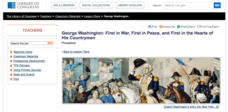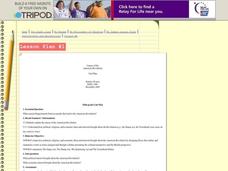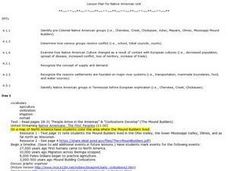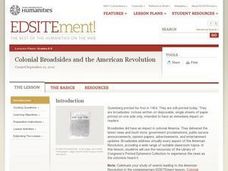Jamestown-Yorktown Foundation
What Was Everyday Life like in Colonial Virginia?
After reflecting on jobs people perform in the present day, scholars discuss what they believe jobs would have been like in Colonial Virginia during the American Revolution. Small groups then perform a jigsaw using informational packets....
Curated OER
Myth and Truth: The First Thanksgiving
Encourage learners to think critically about common myths regarding the Wampanoag Indians in Colonial America. They discover that behind every myth are many possible explanations—and that learning more about American history helps them...
Scholastic
The First Thanksgiving Feast for Grades 6–8
It's time for the feast! Young historians complete their study of the First Thanksgiving by completing an online activity, watching a slideshow, and examining a First Thanksgiving timeline. After answering text-dependent questions to...
Library of Congress
George Washington: First in War, First in Peace, and First in the Hearts of His Countrymen
Does the lens of history portray George Washington as a good leader? A three-lesson unit looks at Washington's early military career as the commander of the Virginia Regiment, his role in the fight for independence from England, and his...
Curated OER
Causes of the American Revolution
Challenge your fifth graders with this instructional activity. They read about the American Revolution, discuss key terms, and engage in a variety of activities. First, they create a timeline, then they answer an online quiz, and finish...
Curated OER
The Trading Post with the Most: Colonial Dorchester's Settlement and Economy
Eighth graders explore the Dorchester settlement, In this American colonial history instructional activity, 8th graders examine primary resources and maps from the Dorchester trading post in order to learn about its contributions to the...
Center for History Education
Who Fired the Shot Heard Round the World?
Take a closer look. Young academics become detectives in an engaging lesson on the American Revolution. Scholars work in groups to analyze documents to uncover whether the American colonists or British soldiers fired the first shot at...
TPS Journal
Sourcing a Document: The First Thanksgiving
How reliable is a painting of the first Thanksgiving if it was created 300 years after the fact? Learners assess the validity of a primary source image to determine what it can actually reveal about this event.
Curated OER
Choosing Sides: The Native Americans' Role in the American Revolution
Students analyze the different roles assumed by various Native American tribes during the American Revolution. They examine the issues involved for Native Americans in choosing the British or the American side of the conflict, such as...
Curated OER
Interdependence: A Colonial Example
Students complete a variety of activities related to Colonial America and how people lived at that time. They conduct research on a selected colonial trade and present an oral report as role-playing that craftsman, and participate in a...
Curated OER
Lesson 1: English-Indian Encounters
What did the English settlers think of the Native Americans inhabiting the Chesapeake region of the United States? Learners analyze a series of documents and images to determine the English perception of the local inhabitants. A great...
Smithsonian Institution
A Ticket to Philly—In 1769: Thinking about Cities, Then and Now
While cities had only a small fraction of the population in colonial America, they played a significant role in pre-revolutionary years, and this was certainly true for the largest city in the North American colonies: Philadelphia. Your...
Curated OER
Colonial America: Causes of the American Revolution
Fourth graders analyze colonial rule and policies with regard to the causes of the American Revolution. In this Colonial America simulation lesson plan, 4th graders role play in an Independence Game, reacting to a variety of "events"...
Curated OER
Harvesting the New World: Changing Land Uses and Contact Between Cultures in Colonial Times
Ninth graders differentiate the Native American and European values. In this world history lesson, 9th graders define colonialism in their own words. They study the effects of epidemics and other diseases to Native American populations.
Curated OER
Colonial America Introduction
Students watch a teacher presented Readers Theater about Colonial America to introduce the students to the topic. In this Colonial America lesson, 4th graders recreate a timeline of early American history, using unconventional...
Curated OER
Causes of the American Revolution
Fifth graders investigate the causes of the American Revolution. They explore how political, religious, and economic ideas and interests brought about the Revolution (e.g., the Stamp Act, the Townshend Acts, taxes on tea, coercive Acts)....
Curated OER
The American Revolution and Its Heroes
Students, through a variety of activities, discover historical aspects of the American Revolution. They make maps and create timelines to track significant events. They create a book about the American Revolution and re-enact Paul...
Scholastic
Teaching About the First Thanksgiving
Learners research information about the Mayflower, Pilgrims, the Plymouth Colony, the Wampanoags, and the first Thanksgiving. They take an online tour of the Mayflower, interpret timelines, create a postcard, and compare and contrast the...
Curated OER
Pre-Colonial Native American Groups
Students investigate U.S. history by researching the Internet and taking a test. For this American Indian group lesson, students identify the many specific Native American tribes and their geographic locations. Students research the web...
Curated OER
Colonial Broadsides and the American Revolution
Students access the Library of Congress's collection of Broadsides (printed material with news, entertainment, advertisements, etc.) and explore their impact on events leading up to the Revolutionary War. They create a timeline with...
Constitutional Rights Foundation
How the First State Constitutions Helped Build the U.S. Constitution
Did you know that the United States Constitution was adopted after many state constitutions were already in place? Young scholars examine facts about the influence of states through an informative and interesting resource. Groups then...
Curated OER
Past Imperfect: Examining Secondary Sources of the American Revolution
Ninth graders respond in essay form to the following writing prompt. Mel Gibson, star of The Patriot, is quoted as stating, "If one were to adhere to historical accuracy all the way, you'd probably have the most boring two hours on...
Curated OER
Pilgrims: The First Americans
Fifth graders become familar with the pilgrims and first Thanksgiving through essays about important people of the time. For this Thanksgiving lesson, 5th graders choose an important figure from the time of the Pilgrims and write a two...
Benjamin Franklin Tercentenary
Reading the Work of B. Franklin, Printer
Placing Ben Franklin’s ideas about a free press next to those embodied in the First Amendment sheds light on both. Learners interpret and compare two primary sources and then examine them in the light of a contemporary survey about...

























